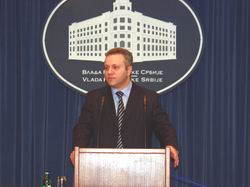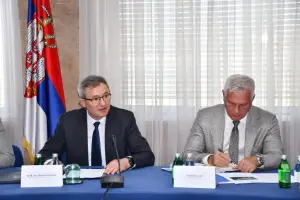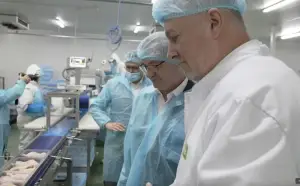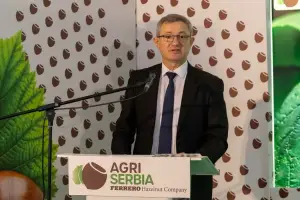Q:
A:
Serbia's 2004 budget to reconcile development, social elements
Belgrade,
22 March 2004
Minister of Finance Mladjan Dinkic has said Serbia's 2004 budget will differ from last year's in that it will be more development-oriented, with and an actual change in the structure of public spending. He said the budget's social element will be fully preserved, while a 73 percent increase in public investment will be provided though spending cuts.
Revenues are expected to amount to 329.3 billion dinars, with total spending of 374.6 billion dinars. A deficit of 45.3 billion dinars will equal 3.6 percent of the GDP, compared with last year's four percent.
Dinkic told a news conference today that the Serbian economy is expected to grow 4.3 percent this year and added that statistical figures showed it grew between 1.5 percent and 2.5 percent in 2003.
He said a realistic estimate of inflation for this year would be between eight percent and 9.5 percent. He recalled that the previous government and the National Bank of Serbia (NBS) had forecast the 2004 inflation at seven percent, which is unrealistic given that retail prices rose 1.4 percent in the first two months of 2004 alone.
Dinkic explained that the strongest growth, of at least eight percent, is expected in the agricultural sector, while industrial production should slightly recover and grow by two percent. The construction sector should grow five percent, while the transport, trade, and services sectors are expected to grow by four percent each.
The projected budget deficit of 45.3 billion dinars will be covered with 15.7 billion dinars in net domestic financing (treasury deposit at the central bank, treasury bills and commercial bank lending), 16.4 billion dinars in privatisation revenues, 3.7 billion dinars in donations, as well as 9.5 billion dinars in international loans, mostly from the World Bank. The 3.7 billion dinars will come in European Union macroeconomic assistance, said Dinkic, noting that overall donation volume this year will be much higher.
The sell-off revenues to be used for covering the projected budget gap include receipts raised from bank privatisations, as well as earnings made from the sale of liquidated banks, the Minister said. He went on to say that the government is due to launch a tender for the sale of Jubanka by end-May, adding that Continental Banka and Novosadska Banka will be the next two banks to be offered for sale.
Public investment will have a much larger share in total public spending and GDP compared with the previous budget, said Dinkic, describing the new budget as both socially and development-oriented spending plan.
Public investment accounted for 17.2 billion dinars in the 2003 budget, he said, noting that their level will rise to 32.4 billion dinars this year. Last year's share of public investment in total spending stood at 5.5 billion dinars, compared with this year's 8.6 billion dinars.
Public investment, which made up 1.5 percent of GDP in 2003, will account for 2.6% of GDP this year, said Dinkic, adding that public investment rose 73 percent year-on-year in real terms.
This year's budget stipulates 290.7 billion dinars for the pension funds, the Serbian health insurance fund and the national employment service. It also envisages 79.3 billion dinars in state subsidies to help the funds cover their gaps.
The budget's development component is reflected in an 18 percent year-on-year increase in funds to be used for stimulating the economy, the Minister said, adding that the funds will account for 11.2 billion of the total spending this year.
According to Dinkic, 5.2 billion dinars will be set aside for road construction, 700 million dinars for project documentation, nine billion dinars for the railway sector and four billion dinars for road reconstruction.
The agriculture, forestry and water management budget will total 22.3 billion dinars. Agriculture budget will make up 18.8 billion of the total sum, compared with seven billion dinars in 2003.
Dinkic added that subsidies make up the major part of the agriculture budget which stipulates two billion dinars for the purchase of wheat for commodity reserves. Apart from production subsidies, significant funds will be invested in the development of professional agricultural services, as well as for increasing the quality of products, said Dinkic, noting that domestic agriculture is largely outdated and food quality has yet to be brought up to EU standards.
The major novelty in the budget is funding for short-term and long-term agricultural loans, worth 3.8 billion dinars. The loans will be approved without mortgage with annual interest rates not exceeding three percent.
Dinkic said that funds have been earmarked for a project of registration of agricultural producers, which should be completed by the end of spring, stressing that subsidies will be granted only to registered farmers with a bank account. That way, they will enter the legal system of production.
The 2004 budget will also secure funds for bank loan insurance. He said that 1.5 billion dinars have been earmarked for the Guarantee Fund. Changes to the Law on Guarantee Fund will allow the state to disburse loans for farmers and underdeveloped regions, alongside with loans for small and medium-sized enterprises. The guarantees will cover 80 percent of a loan's total amount.
The budget envisages funds for the setting up of a national housing loan insurance corporation and an export insurance fund. The budget also stipulates 1.5 billion dinars for the restructuring of the banking system.
Dinkic said that the budget also envisages regular servicing of the external and internal debt. The funds for the payment of frozen hard currency savings have been secured, as well as for the payment of the first part of the state's debt to citizens who lent their money for Serbia's economic recovery in late 1980s. A bill regulating that field will be forwarded to the Serbian parliament by late March. According to the bill, the repayment of the first part of the debt should begin on August 31, while the entire debt should be paid off in four years' time.
The Minister went on to say that a cut in public administration spending will save substantial funds in this year's budget.
Serbia's budget this year will finance Serbia-Montenegrin spending with 53.3 billion, he said. Although the Constitutional Charter stipulates that Serbia should finance 92 percent of the state union's spending and Montenegro the remaining eight percent, Serbia has been securing 99 percent of the necessary funding because Montenegro has failed to settle its obligations, he stressed.
The Ministry of Health's budget will be 70 percent higher than last year, said Dinkic, noting that it will include funds for refugees for the first time ever. It will also stipulate a 22.8 percent rise in health funding and a 40 percent increase in funding for science.
The budget also envisages substantial funding for the culture sector which the Minister said will be three times as high as the amount in 2003. The government will set aside €1.2 million to help repair the Hilandar monastery, plus 3.2 billion for the national TV station RTS.
Dinkic told a news conference today that the Serbian economy is expected to grow 4.3 percent this year and added that statistical figures showed it grew between 1.5 percent and 2.5 percent in 2003.
He said a realistic estimate of inflation for this year would be between eight percent and 9.5 percent. He recalled that the previous government and the National Bank of Serbia (NBS) had forecast the 2004 inflation at seven percent, which is unrealistic given that retail prices rose 1.4 percent in the first two months of 2004 alone.
Dinkic explained that the strongest growth, of at least eight percent, is expected in the agricultural sector, while industrial production should slightly recover and grow by two percent. The construction sector should grow five percent, while the transport, trade, and services sectors are expected to grow by four percent each.
The projected budget deficit of 45.3 billion dinars will be covered with 15.7 billion dinars in net domestic financing (treasury deposit at the central bank, treasury bills and commercial bank lending), 16.4 billion dinars in privatisation revenues, 3.7 billion dinars in donations, as well as 9.5 billion dinars in international loans, mostly from the World Bank. The 3.7 billion dinars will come in European Union macroeconomic assistance, said Dinkic, noting that overall donation volume this year will be much higher.
The sell-off revenues to be used for covering the projected budget gap include receipts raised from bank privatisations, as well as earnings made from the sale of liquidated banks, the Minister said. He went on to say that the government is due to launch a tender for the sale of Jubanka by end-May, adding that Continental Banka and Novosadska Banka will be the next two banks to be offered for sale.
Public investment will have a much larger share in total public spending and GDP compared with the previous budget, said Dinkic, describing the new budget as both socially and development-oriented spending plan.
Public investment accounted for 17.2 billion dinars in the 2003 budget, he said, noting that their level will rise to 32.4 billion dinars this year. Last year's share of public investment in total spending stood at 5.5 billion dinars, compared with this year's 8.6 billion dinars.
Public investment, which made up 1.5 percent of GDP in 2003, will account for 2.6% of GDP this year, said Dinkic, adding that public investment rose 73 percent year-on-year in real terms.
This year's budget stipulates 290.7 billion dinars for the pension funds, the Serbian health insurance fund and the national employment service. It also envisages 79.3 billion dinars in state subsidies to help the funds cover their gaps.
The budget's development component is reflected in an 18 percent year-on-year increase in funds to be used for stimulating the economy, the Minister said, adding that the funds will account for 11.2 billion of the total spending this year.
According to Dinkic, 5.2 billion dinars will be set aside for road construction, 700 million dinars for project documentation, nine billion dinars for the railway sector and four billion dinars for road reconstruction.
The agriculture, forestry and water management budget will total 22.3 billion dinars. Agriculture budget will make up 18.8 billion of the total sum, compared with seven billion dinars in 2003.
Dinkic added that subsidies make up the major part of the agriculture budget which stipulates two billion dinars for the purchase of wheat for commodity reserves. Apart from production subsidies, significant funds will be invested in the development of professional agricultural services, as well as for increasing the quality of products, said Dinkic, noting that domestic agriculture is largely outdated and food quality has yet to be brought up to EU standards.
The major novelty in the budget is funding for short-term and long-term agricultural loans, worth 3.8 billion dinars. The loans will be approved without mortgage with annual interest rates not exceeding three percent.
Dinkic said that funds have been earmarked for a project of registration of agricultural producers, which should be completed by the end of spring, stressing that subsidies will be granted only to registered farmers with a bank account. That way, they will enter the legal system of production.
The 2004 budget will also secure funds for bank loan insurance. He said that 1.5 billion dinars have been earmarked for the Guarantee Fund. Changes to the Law on Guarantee Fund will allow the state to disburse loans for farmers and underdeveloped regions, alongside with loans for small and medium-sized enterprises. The guarantees will cover 80 percent of a loan's total amount.
The budget envisages funds for the setting up of a national housing loan insurance corporation and an export insurance fund. The budget also stipulates 1.5 billion dinars for the restructuring of the banking system.
Dinkic said that the budget also envisages regular servicing of the external and internal debt. The funds for the payment of frozen hard currency savings have been secured, as well as for the payment of the first part of the state's debt to citizens who lent their money for Serbia's economic recovery in late 1980s. A bill regulating that field will be forwarded to the Serbian parliament by late March. According to the bill, the repayment of the first part of the debt should begin on August 31, while the entire debt should be paid off in four years' time.
The Minister went on to say that a cut in public administration spending will save substantial funds in this year's budget.
Serbia's budget this year will finance Serbia-Montenegrin spending with 53.3 billion, he said. Although the Constitutional Charter stipulates that Serbia should finance 92 percent of the state union's spending and Montenegro the remaining eight percent, Serbia has been securing 99 percent of the necessary funding because Montenegro has failed to settle its obligations, he stressed.
The Ministry of Health's budget will be 70 percent higher than last year, said Dinkic, noting that it will include funds for refugees for the first time ever. It will also stipulate a 22.8 percent rise in health funding and a 40 percent increase in funding for science.
The budget also envisages substantial funding for the culture sector which the Minister said will be three times as high as the amount in 2003. The government will set aside €1.2 million to help repair the Hilandar monastery, plus 3.2 billion for the national TV station RTS.











